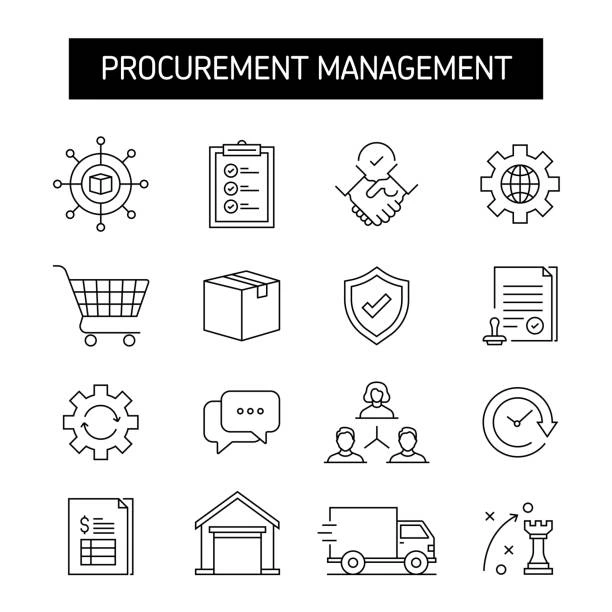Course Overview:
Sustainable Procurement and Supply Chain Management course is designed to address the growing global demands for businesses to adopt environmentally, socially, and economically sustainable practices in supply chain management. Participants will explore sustainable procurement processes, supplier evaluation, eco-friendly supply chain strategies, and how to reduce environmental impact while maintaining economic value. Through a combination of theoretical lessons and practical case studies, participants will learn how to implement sustainable initiatives that align with organizational objectives, international standards, and regulatory requirements. The course will also provide insights into best practices for managing risks, optimizing supply chain performance, and fostering supplier relationships that promote sustainability.
Duration
10 Days
Who Should Attend
- Procurement professionals
- Supply chain managers and officers
- Sustainability officers and managers
- Environmental and social responsibility officers
- Logistics and operations managers
- Professionals from industries such as manufacturing, retail, and construction
- Government officials and policy-makers involved in procurement
- Consultants and professionals interested in integrating sustainability into supply chain operations
Course Objectives
By the end of this course, participants will be able to:
- Understand the fundamentals of sustainable procurement and its role in supply chain management.
- Identify key sustainability drivers and integrate them into procurement policies and processes.
- Assess and select suppliers based on sustainability criteria.
- Implement sustainable strategies to reduce environmental and social impacts throughout the supply chain.
- Manage risks related to sustainability in supply chain operations.
- Develop and apply tools and frameworks to measure and monitor sustainability performance.
- Collaborate with stakeholders to enhance sustainability initiatives.
- Align supply chain practices with global standards and regulatory frameworks on sustainability.
- Promote circular economy concepts and resource efficiency in supply chain processes.
- Create sustainable value chains that enhance both environmental responsibility and economic efficiency.
Course Outline:
Module 1: Introduction to Sustainable Procurement & Supply Chain Management
- Overview of sustainability in supply chains
- Defining sustainable procurement
- Global trends and drivers of sustainable supply chains
- Benefits of sustainability in procurement and supply chain
Module 2: Legal and Regulatory Frameworks for Sustainable Procurement
- International sustainability standards (ISO 20400, UN Sustainable Development Goals)
- Government policies and frameworks
- Compliance and risk management in sustainable procurement
- Ethical and social procurement considerations
Module 3: Sustainable Procurement Practices and Policy Development
- Developing sustainable procurement policies
- Sustainability in tendering and contract management
- Supplier engagement and collaboration
- Case studies of successful sustainable procurement initiatives
Module 4: Supplier Evaluation and Selection for Sustainability
- Sustainability criteria for supplier selection
- Supplier risk management
- Conducting supplier audits for environmental and social compliance
- Building long-term sustainable supplier partnerships
Module 5: Sustainable Supply Chain Strategy Development
- Green supply chain management (GSCM) principles
- Reducing environmental impacts across the supply chain
- Case studies on green logistics and supply chain management
- Developing a sustainable supply chain strategy
Module 6: Sustainable Sourcing and Circular Economy
- Sustainable sourcing strategies
- Role of circular economy in supply chains
- Product lifecycle analysis
- Reuse, recycling, and waste management in supply chains
Module 7: Measuring and Monitoring Sustainability in Supply Chains
- Key performance indicators (KPIs) for sustainability
- Tools and techniques for measuring environmental, social, and economic impacts
- Data collection and analysis for sustainable supply chain reporting
- Sustainability reporting frameworks (GRI, CDP, etc.)
Module 8: Innovation and Technology in Sustainable Supply Chain Management
- Role of digital transformation in sustainable supply chains
- Emerging technologies for sustainability (Blockchain, IoT, AI)
- Smart logistics and reducing carbon footprints through technology
- Case studies of technological innovations for sustainable supply chains
Module 9: Risk Management in Sustainable Procurement
- Identifying and mitigating sustainability risks in procurement
- Environmental, social, and governance (ESG) risks
- Managing reputational risks and building resilience in supply chains
- Crisis management and sustainability
Module 10: Sustainable Supply Chain Leadership and Future Trends
- Leadership in driving sustainable procurement
- Future trends in sustainable supply chains
- Building a culture of sustainability in organizations
- Developing action plans for sustainable supply chain transformation
Customized Training
This training can be tailored to your institution needs and delivered at a location of your choice upon request.
Requirements
Participants need to be proficient in English.
Training Fee
The fee covers tuition, training materials, refreshments, lunch, and study visits. Participants are responsible for their own travel, visa, insurance, and personal expenses.
Certification
A certificate from Ideal Sense & Workplace Solutions is awarded upon successful completion.
Accommodation
Accommodation can be arranged upon request. Contact via email for reservations.
Payment
Payment should be made before the training starts, with proof of payment sent to outreach@idealsense.org.
For further inquiries, please contact us on details below:






